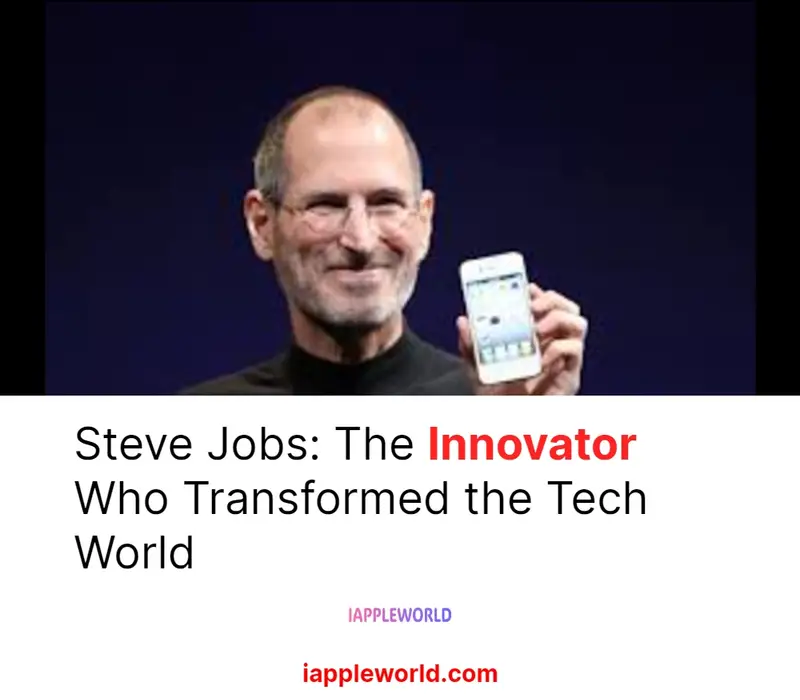Steve Jobs: The Innovator Who Transformed the Tech World

Steve Jobs: The Visionary Behind Apple's Revolution
Steve Jobs wasn't just a businessman; he was a cultural icon, a revolutionary force in technology, and the driving spirit behind Apple's meteoric rise. His relentless pursuit of perfection, combined with an uncanny ability to anticipate market trends, transformed industries and shaped the way we interact with technology today. This exploration delves into the life, career, and enduring legacy of Steve Jobs.
Early Life and Influences:
Born in San Francisco in 1955 and adopted by Paul and Clara Jobs, Steve's early life was marked by a restless curiosity. Growing up in the burgeoning Silicon Valley, he was exposed to the world of electronics and innovation from a young age. A pivotal moment was a summer job at Hewlett-Packard, where he met Steve Wozniak, a brilliant engineer who would become his partner in founding Apple.
The Birth of Apple:
In 1976, in the Jobs' family garage, Apple Computer Company was born. Wozniak's engineering prowess combined with Jobs' vision to create user-friendly personal computers resulted in the Apple I, followed by the groundbreaking Apple II, which propelled the company into the spotlight of the emerging personal computer market.
The Macintosh Revolution:
Jobs's fascination with graphical user interfaces (GUIs) led him to Xerox PARC, where he witnessed the potential of mouse-driven computing. This inspiration fueled the development of the Macintosh, launched in 1984. The Mac, with its intuitive interface and focus on design, represented a paradigm shift in personal computing, making technology accessible to a wider audience.
Exile and Innovation: NeXT and Pixar:
Despite the Macintosh's innovative nature, internal conflicts led to Jobs's departure from Apple in 1985. This period, however, was not one of inactivity. He founded NeXT Inc., a computer company focused on the educational and business markets, and acquired The Graphics Group, which he transformed into Pixar Animation Studios. Pixar's groundbreaking computer-animated films, such as "Toy Story," redefined animation and demonstrated Jobs's ability to nurture creative talent.
The Return to Apple and the iEra:
In 1997, Apple, facing near bankruptcy, acquired NeXT. This marked Jobs's triumphant return, ushering in an era of unprecedented innovation and growth. Under his leadership, Apple streamlined its product line and focused on creating elegant, user-friendly devices.
- The iMac (1998): The colorful, all-in-one iMac revitalized Apple's image and signaled a renewed focus on design.
- The iPod (2001): The iPod revolutionized the music industry, making digital music portable and accessible.
- The iPhone (2007): The iPhone redefined the mobile phone, introducing the world to the modern smartphone with its multi-touch interface and app ecosystem.
- The iPad (2010): The iPad created a new category of computing devices, bridging the gap between laptops and smartphones.
Design Philosophy and Leadership Style:
Jobs's design philosophy was rooted in simplicity, elegance, and user experience. He had an unwavering attention to detail, insisting on perfection from the inside out. His leadership style, while sometimes demanding, inspired his teams to achieve seemingly impossible feats. He fostered a culture of innovation and risk-taking, pushing the boundaries of what was possible.
The Stanford Commencement Address:
Jobs's 2005 Stanford commencement address remains one of the most inspiring speeches ever delivered. He shared personal anecdotes about his life, including his adoption, his time at Reed College, and his battle with cancer, urging graduates to "stay hungry, stay foolish" and to follow their hearts.
Legacy and Impact:
Steve Jobs's impact on the world is immeasurable. He transformed the personal computer, the music industry, the mobile phone, and the animation industry. His vision and leadership continue to inspire innovators and entrepreneurs around the world. He left behind a legacy of groundbreaking products, a culture of innovation at Apple, and a profound impact on the way we live and interact with technology. His story is a testament to the power of vision, passion, and perseverance.
Key Contributions and Innovations:
- Personal Computers: Pioneered the user-friendly personal computer with the Apple II and Macintosh.
- Digital Music: Revolutionized music distribution with the iPod and iTunes.
- Mobile Computing: Ushered in the age of the smartphone with the iPhone and the tablet with the iPad.
- Animated Film: Transformed animation with Pixar's groundbreaking computer-generated films.
- Retail Experience: Redefined the retail experience with the Apple Store.
- Design Philosophy: Championed minimalist, elegant design focused on user experience.